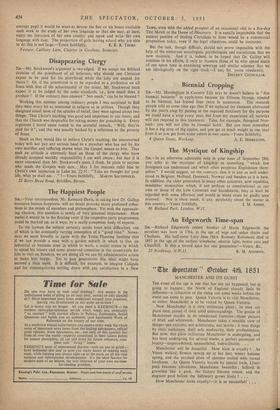The Happiest People
Sm,—Your correspondent, Mr. Kennard Davis, in asking how Dr. Gallup measures human happiness, will no doubt provoke many profound reflec- tions in the minds of moralists and philosophers. Yet with the approach- ing election, this question is surely of very practical importance. How useful it would be to the floating voter if the respective party programmes could be marked up, as it wee, by a really competent body of experts.
To the layman the subject certainly seems beset with difficulties, one of which is the constantly varying conception of a "good time." Nowa- days we seem broadly to agree with the Town Planning Institute that if we can provide a man with a garden suburb in which to live, an Industrial or business zone in which to work, a social centre in which to spend his leisure and some preserved amenities in the countryside for him to visit on Sundays, we are doing all we can by administrative action to make him happy. Yet to past generations this ideal might have seemed a little tepid. It is difficult, for example, to imagine Caligula and 'his contemporaries settling down with any satisfaction in a New
Town, even with the added prospect of an occasional visit to a five-day Test Match or the Dome of Discovery. It is equally improbable that' the ancient pastime of feeding Christians to lions would be a commercial proposition today, even if the legal objections could be overcome.
But the task, though difficult, should not prove impossible with the help of the numerous sociologists, psychologists and statisticians that we now maintain. And it is, indeed, to be hoped that Dr. Gallup will continue in his efforts, if only to reassure those of us who spend much of our spare time in examining sewerage and similar schemes that we are ideologically on the right track.—1 am; Sir, yours obediently,
DISTRICT COUNCILLOR.





















































 Previous page
Previous page